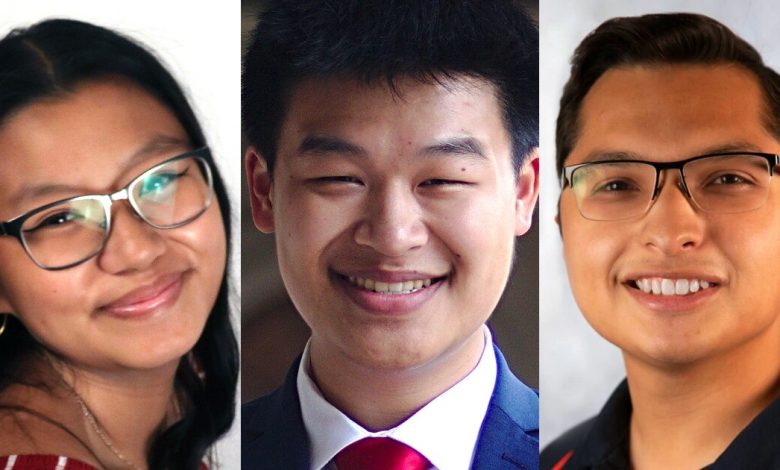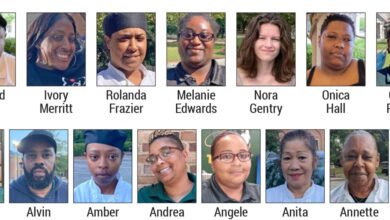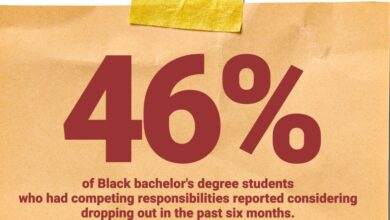Why Over 100 Campus Leaders Asked Biden to Cancel Student-Loan Debt

Caren Royce Yap started thinking about how she would afford a higher education long before she set foot on campus. When she was a freshman in high school, one of her teachers told the class that even after being out of college for 25 years, the teacher was still paying off student loans.
The comment stuck with Yap. Today she is the student-body president at the University of Nevada at Las Vegas, and she’s one of 111 student-government leaders who signed a letter this week calling on the Biden administration to cancel federal student-loan debt.
Concerned about how she would be able to afford college, Yap says she worked hard in high school to earn a scholarship. As student-body president, she’s seen others struggle to pay their tuition, sometimes dropping out or transferring to less-costly community colleges instead.
Like Yap, many of the student leaders who signed the letter said they had been motivated to do so by a concern with the decades-long drag that debt can exert on people in the years after they leave college. “Part of the goal of this is recentering the conversation to be about students,” said David Bruen, Syracuse University’s student-body president and one of the letter’s organizers. “This is not just a Gen Z problem, and of course it’s not just wealthy or well-connected people in Gen Z impacted.”
The letter urges President Biden to consider how canceling debt would promote racial equity, spur economic recovery, and encourage educational access.
About 43 million people share the nation’s $1.5-trillion student-debt load, and research has suggested that nonwhite borrowers see the greatest drag on their future prospects. A 2019 report found that, two decades after enrolling in college, median white student-loan borrowers will have paid off 94 percent of their debt, but median Black borrowers will still owe 95 percent of theirs. Women hold a disproportionate share of the nation’s student-loan debt, with Black women holding the highest average debt of any subset of bachelor’s-degree holders.
Ranen Miao, Washington University in St. Louis’s student-body president and another of the letter’s organizers, said the focus on erasing student debt as a way to tackle racial inequities was intentional. “We wanted to make it as comprehensive and as inclusive as possible, to point out the mass disparities that exist within student-loan debt in this country — whether it be for LGBTQ borrowers or Black borrowers or Hispanic and Latinx borrowers, and for women who bear a disproportionate brunt of debt,” Miao said.
Miao has only about $5,000 in student loans, he said, because he has received need-based financial aid. He said he feels lucky, and knows that many students don’t.
Shackled in Debt
While Biden has said he would cancel $10,000 in federal student debt for each borrower, more than a year into his term he hasn’t followed through. Instead of using his executive authority to erase student debt, as the student leaders are urging him to do, the president has said he awaits congressional action and has expressed doubt about his ability to use executive authority for this purpose. While it’s been almost two years since borrowers have had to make student-loan payments, the government’s pandemic-related pause expires on May 1.
The letter calls for full cancellation of federal student-loan debt. But many who signed said the debt would probably need to be canceled incrementally. Still, even the $10,000 in forgiveness per borrower that Biden promised could have sweeping effects — about a third of federal student-loan borrowers hold less than $10,000 in debt. “It’s just good for our society,” Miao said, “to make sure that kids are not shackled to their debt for 20, 30, 40 years after they graduate, which will delay their ability to start businesses, to found nonprofits, to start families, to do all these other things that I think people consider part of their American dream.”
Like many who signed the letter, Landon Brickey of the University of Missouri at Columbia received scholarship money that’s helping him cover his tuition. He said he would finish his undergraduate degree with $6,000 to $7,000 in student-loan debt. “I talk to so many people in this role, and you hear so many stories,” he said. “My stepmom didn’t pay off all of her student loans until she was in her 40s.”
Hannah Bruns, student-body president of Vanderbilt University, has a full-tuition scholarship but is still on the hook for expenses like food and housing. At Vanderbilt, where undergrads are generally required to live on campus, those expenses can run to $20,000 a year.
While her parents have helped, they are also subsidizing her brother’s master’s degree, Bruns said. She has a job and was able to get permission to live off campus this year, which has helped cut costs. But she still has had to take out loans.
“I know that I’ll probably be paying off my student debt well beyond the time I have children of my own, which is hard to grasp and made me start to realize how much student debt really holds people back,” Bruns said. “You have people who are paying off their college until they are in their 50s or 60s — some people dying and still owing debt for going to a university. And it’s like, how do you expect people to prosper and follow their dreams if they have so much debt holding them back?”
Jose Escobedo, the University of Texas at San Antonio’s student-body president, said he had taken on debt to cover his education — something he thinks about regularly.
“We aren’t even talking about further education,” Escobedo said. “The sad part is my story isn’t all that rare either. I’m in debt, probably on the lower end of debt because I attend a university that is pretty good as far as the financial aid it covers … I can only imagine what other students have to do when they graduate and start having to pay those debts.”
Escobedo said he recognizes that persuading the Biden administration to erase federal student debt is an uphill battle.
“Realistically speaking, this probably isn’t something we are going to be able to tackle this administration, or maybe even the next administration,” Escobedo said. “But I’m hoping that this generation of mine — if it comes down to it — we can at least stop it when it comes to be our turn. Let’s hope it doesn’t get to that point, but if need be, we will take care of it.”
Source link






